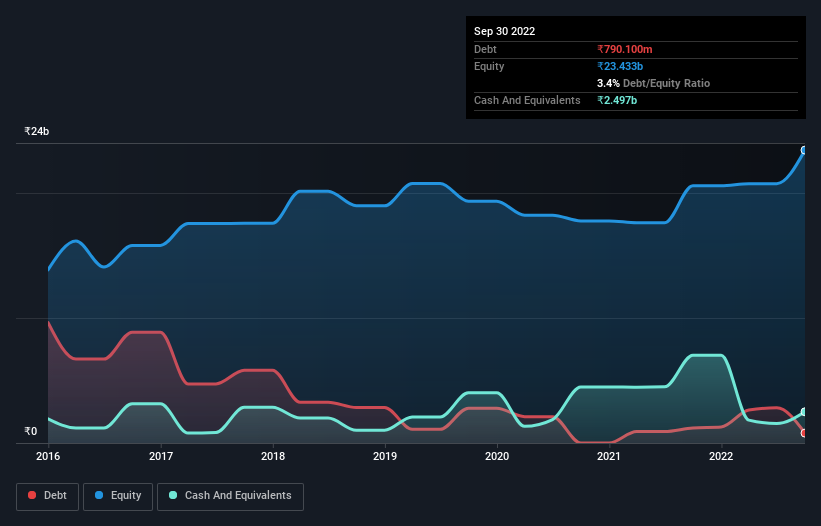
David Iben put it well when he said, 'Volatility is not a risk we care about. What we care about is avoiding the permanent loss of capital.' When we think about how risky a company is, we always like to look at its use of debt, since debt overload can lead to ruin. We note that Emami Limited (NSE:EMAMILTD) does have debt on its balance sheet. But the more important question is: how much risk is that debt creating?
When Is Debt A Problem?
Generally speaking, debt only becomes a real problem when a company can't easily pay it off, either by raising capital or with its own cash flow. In the worst case scenario, a company can go bankrupt if it cannot pay its creditors. While that is not too common, we often do see indebted companies permanently diluting shareholders because lenders force them to raise capital at a distressed price. Of course, debt can be an important tool in businesses, particularly capital heavy businesses. The first thing to do when considering how much debt a business uses is to look at its cash and debt together.
Check out our latest analysis for Emami
What Is Emami's Debt?
As you can see below, Emami had ₹790.1m of debt at September 2022, down from ₹1.21b a year prior. However, its balance sheet shows it holds ₹2.50b in cash, so it actually has ₹1.71b net cash.

How Strong Is Emami's Balance Sheet?
Zooming in on the latest balance sheet data, we can see that Emami had liabilities of ₹7.52b due within 12 months and liabilities of ₹785.5m due beyond that. Offsetting these obligations, it had cash of ₹2.50b as well as receivables valued at ₹3.58b due within 12 months. So its liabilities outweigh the sum of its cash and (near-term) receivables by ₹2.22b.
Having regard to Emami's size, it seems that its liquid assets are well balanced with its total liabilities. So it's very unlikely that the ₹204.8b company is short on cash, but still worth keeping an eye on the balance sheet. While it does have liabilities worth noting, Emami also has more cash than debt, so we're pretty confident it can manage its debt safely.
On the other hand, Emami saw its EBIT drop by 6.1% in the last twelve months. If earnings continue to decline at that rate the company may have increasing difficulty managing its debt load. When analysing debt levels, the balance sheet is the obvious place to start. But it is future earnings, more than anything, that will determine Emami's ability to maintain a healthy balance sheet going forward. So if you're focused on the future you can check out this free report showing analyst profit forecasts.
Finally, a company can only pay off debt with cold hard cash, not accounting profits. Emami may have net cash on the balance sheet, but it is still interesting to look at how well the business converts its earnings before interest and tax (EBIT) to free cash flow, because that will influence both its need for, and its capacity to manage debt. Over the last three years, Emami recorded free cash flow worth a fulsome 95% of its EBIT, which is stronger than we'd usually expect. That puts it in a very strong position to pay down debt.
Summing Up
We could understand if investors are concerned about Emami's liabilities, but we can be reassured by the fact it has has net cash of ₹1.71b. The cherry on top was that in converted 95% of that EBIT to free cash flow, bringing in ₹1.4b. So we don't think Emami's use of debt is risky. When analysing debt levels, the balance sheet is the obvious place to start. But ultimately, every company can contain risks that exist outside of the balance sheet. For example Emami has 2 warning signs (and 1 which is a bit concerning) we think you should know about.
When all is said and done, sometimes its easier to focus on companies that don't even need debt. Readers can access a list of growth stocks with zero net debt 100% free, right now.
Valuation is complex, but we're here to simplify it.
Discover if Emami might be undervalued or overvalued with our detailed analysis, featuring fair value estimates, potential risks, dividends, insider trades, and its financial condition.
Access Free AnalysisHave feedback on this article? Concerned about the content? Get in touch with us directly. Alternatively, email editorial-team (at) simplywallst.com.
This article by Simply Wall St is general in nature. We provide commentary based on historical data and analyst forecasts only using an unbiased methodology and our articles are not intended to be financial advice. It does not constitute a recommendation to buy or sell any stock, and does not take account of your objectives, or your financial situation. We aim to bring you long-term focused analysis driven by fundamental data. Note that our analysis may not factor in the latest price-sensitive company announcements or qualitative material. Simply Wall St has no position in any stocks mentioned.
About NSEI:EMAMILTD
Emami
Manufactures and markets personal and healthcare products in India and internationally.
Flawless balance sheet with proven track record and pays a dividend.
Similar Companies
Market Insights
Community Narratives



